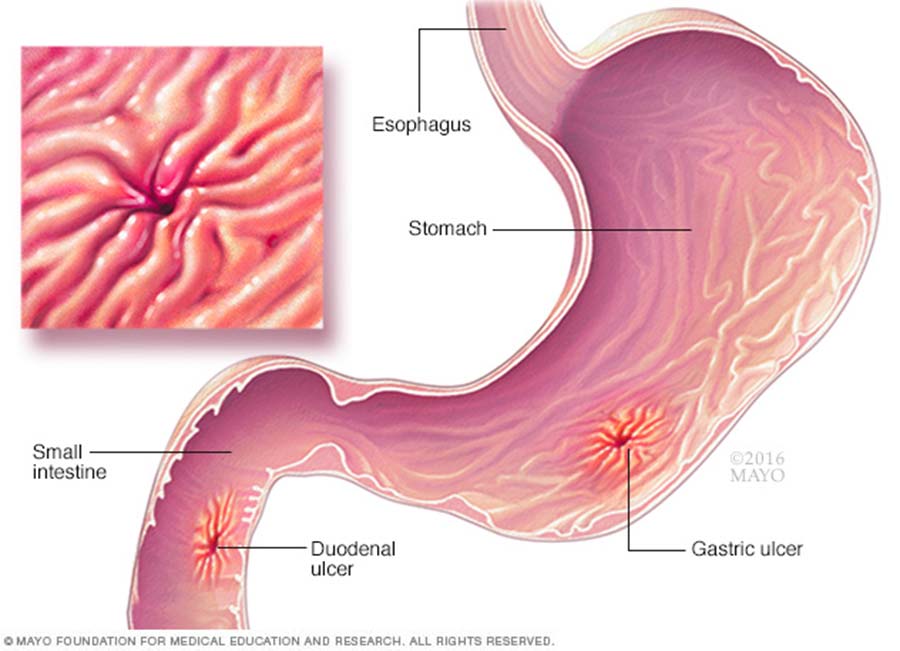Kashmir may be one of the few spots across Asia where stomach ulcers are above average, Zeenat Farooq details the prognosis and the treatment for the very basic health crisis

Stomach ulceration is a condition in which the inner lining of stomach wall is wounded. It happens primarily because of wearing off of the mucus layer.
Normally, when the food enters stomach, the cells in the stomach are stimulated to produce HCl (hydrochloric acid). This acid provides appropriate pH at which the enzymes of the stomach work. In addition, it helps prevent growth of any harmful microbes which might find their way into the stomach along with food. In order to protect the stomach wall from being digested by its own enzymes and to protect it from acidic environment, some cells secrete mucus which forms a thick layer around the inner lining of stomach. Stomach ulcers start developing when, by any reason, the mucus layer is not formed or its formation is compromised.
Causes
The most common cause of ulcer development is intake of pain killers known as NSAIDs (non steroidal anti inflammatory drugs). These drugs act on the gastric enzyme cyclooxygenase 1as a side-effect and thus block mucus secretion which renders the stomach wall vulnerable to damage. Other causes can be infection with the bacterium Helicobacter pylori. It is an infectious bacterium which inhabits the wall of stomach and grows as a parasite. A large section of Kashmir population (~60%) is infected with this bacterium.
Risk Factors
Smoking, drinking, continued use of steroids, stress and genetic factors are the most prominent risk factors for this condition. These factors lead to increase in acid secretion which contributes to development of stomach ulcers.
Symptoms
The most common symptom of stomach ulceration is dyspepsia (indigestion). This might be accompanied by pain in the stomach which resembles heartburn. Sometimes, ulceration might go unnoticed for a long time and is apparent only upon passage of blood in the stool and consequent iron deficiency anaemia. In such a case, immediate medical consultation is a necessity.
Precautions
Avoid spicy and processed foods, stress, smoking, drinking and consumption of large doses of caffeine. All of these contribute to or even worsen dyspepsia and also does not allow the ulcer to heal because of the constituents these foods contain. Stress stimulates HCl secretion, thereby causing or worsening stomach ulcers.
Diagnosis
It begins with a series of questions asked by the doctor about the nature and frequency of pain, site of pain, and other associated problems. It is only after thorough consultation that a doctor can actually decide whether a patient might have ulcer which can further be detected by endoscopy.
Treatment
Once the detection is over, treatment option relies upon the underlying reason behind ulcer development. If the cause is H pylori infection (which can be detected by a breath test), treatment relies on containing the infection to allow the ulcer to heal subsequently. In this case, the treatment might take a little longer. If the cause is intake of NSAIDs, the doctor might ask the patient to stop the intake or might replace it with some other treatment to relieve pain. Proton pump inhibitors (PPIs) are given to the patient as the first line of defence to block HCl secretion so as to allow healing of the ulcer in a natural manner under neutral pH conditions. Drugs which lower acid production might also be prescribed. Over the counter (OTC) medicines like alginate or other antacids can also prove soothing.
If the condition is worse than this, a specialist might recommend surgery but such treatment is recommended only in severe cases when the ulcer has progressed to a stage of perforation (a hole in the stomach wall). Surgery can also be recommended in cases when the ulcer does not heal naturally upon controlling HCl secretion or infection (whichever the cause behind ulcer development may be), recurrent worsening, dyspepsia continues even after treatment, or if bleeding continues. The objective of surgery is to remove the ulcer, seal the stomach wall, seal the blood vessels in the ulcer area to stop bleeding and cut the nerves in the area to control acid production in the stomach.
(Author is a research fellow at Department of Biotechnology, University of Kashmir)















